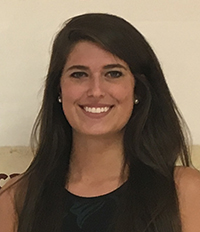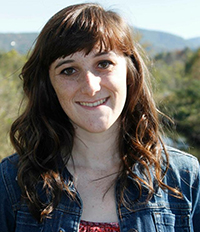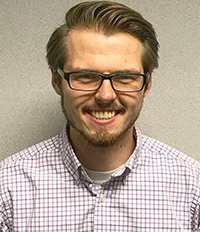Graduates in new MAT’s first cohort head for classrooms
Want to know more about the MAT?
We’re holding online information sessions about our MAT program. Click here to register or to learn more about the program.
Information sessions will be held Sept. 5 and Dec. 5.
The deadline to apply for the Summer 2019 MAT program is Feb. 12, 2019.
With both her mother and grandmother having worked as educators, Anna Blackwell already knew when she came to Carolina how rewarding teaching can be.
“I knew I wanted to do high school social studies education since before I came to UNC,” said Blackwell, who grew up in the Caswell County town of Yanceyville. “I went to academic advising my freshman year and said, ‘I want to teach … high school social studies. How do I do that at UNC?”
Her advisor put her in touch with the School of Education, where she learned about the restructured Master of Arts in Teaching program. In May, Blackwell was among the first cohort of students to graduate from the new program.
This week, she starts her teaching career at the Chatham Center for Innovation in Siler City. “I enjoyed it a lot,” Blackwell said of the MAT program. “I made a lot of good friends in it. (There were) a lot of really good people in my program. And I definitely learned a lot with the student teaching and all the different opportunities offered.”
‘A really seamless experience’
The Master of Arts in Teaching (MAT) program replaced the School of Education’s undergraduate programs in elementary and middle grades education. It is a one-year program, or 15 months for students who want to specialize in English as a Second Language or special education.
Students become specialists in their content areas through coursework, a two-semester residency in a public school, and the School’s signature pedagogy of experiential education.
“There’s a ton of field experience embedded in this, and that’s only possible through a master’s program in that way because they aren’t doing other undergraduate requirements from a bunch of different majors,” said Kristin Papoi, clinical assistant professor and coordinator of the MAT program. “It’s very focused. And it’s a really seamless experience all the way through.”
Papoi said this inaugural cohort of 23 students included those who came into the program after finishing their undergraduate degree and others who enrolled from other universities, or returned to school after having spent a year or two in another field.
She said these first students helped shape what the MAT program has become through their feedback on various components of the program.
That the group was a small one was a plus for some in the program.
“The fact that we were so small allowed us to really get to know our professors and work closely with them and our classmates as well,” said Katie Moninghoff (MAT ’18), one of the four students in the elementary education cohort.
Moninghoff, a native of Franklin, said she felt comfortable sharing and collaborating with her classmates. And Moninghoff said she enjoyed the Outward Bound experience, the experiential education component. Moninghoff and her classmates hiked in Linville Gorge. She said it taught her about community and the kind of community she wants to give the students in her classroom.
Moninghoff is excited to start her teaching career in August at Club Boulevard Magnet Elementary School in Durham, the same school where she did her student teaching. Moninghoff will teach second grade. With its focus on the humanities, she said the school is a perfect fit for her. “I had a fantastic time at Club Boulevard,” said Moninghoff, who is a dancer and enjoys reading and writing.
Teaching opportunity bring excitement, nervousness
Tim Walker, another member of the revised MAT’s first cohort, said his student teaching experience really challenged him.
He pursued teaching because he has a brother with a learning disability who he regularly helped with schoolwork. He recalled feeling a sense of pride in watching his brother accept his diploma, knowing he had played a hand in that.
However, he found doing lesson plans and other aspects of being a successful teacher a little harder than tutoring. He is thankful he had a great mentor teacher at Carrboro High School who gave him advice and guided him along the way. And when he failed, she was there for him to ask questions and to help him figure out what he had done wrong.
“It was very good and it was very tough,” Walker said of the student teaching experience. He will be teaching history at Carrboro High School in the upcoming academic year.
The School of Education has district partners in the Chapel Hill-Carrboro City Schools, and Durham, Orange and Chatham county schools. Papoi said more than 49 teachers have agreed to be mentors to students in the MAT program. Students start at their respective schools on the first day of the school year and are there for two weeks initially. They start a biweekly fieldwork schedule later in the fall, and do full-time student teaching during the spring semester.
Blackwell, who did her student teaching at Jordan Matthews High School in Siler City, said her teacher mentor has promised to help her through her first couple of years teaching.
That will be easy: Jordan Matthews and the Chatham Center for Innovation are across the street from each other. That makes Blackwell feel better as she embarks upon her career.
“I’m really excited, but I’m really nervous,” she said.
Gearing up for growth
The MAT program has doubled its students this year. Papoi said there are 49 students in the second cohort, which started in June. She would love to see the program grow to 75 next year.
Students who choose to enroll in the MAT program will benefit from what she called a broad set of very qualified faculty who know the field and care very deeply about preparing highly qualified teachers for North Carolina. The program also helps diversify the teacher graduate pool, as it draws people from other fields and a various range of experiences.
“We want to continually grow,” Papoi said. “What I like to say is anybody who wants to be a teacher and is qualified to do so and is eager to do that, we want them. We want to talk with them.”